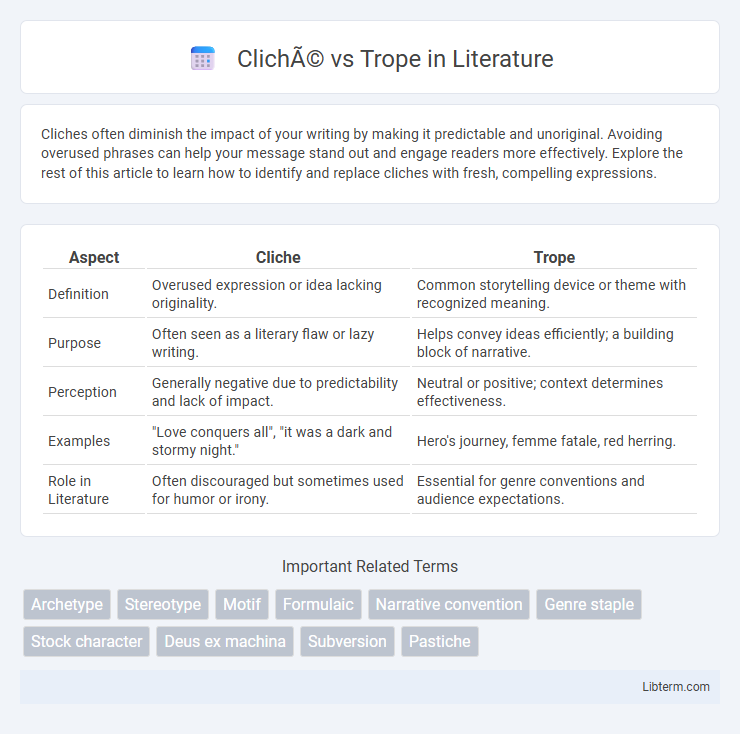Cliches often diminish the impact of your writing by making it predictable and unoriginal. Avoiding overused phrases can help your message stand out and engage readers more effectively. Explore the rest of this article to learn how to identify and replace cliches with fresh, compelling expressions.
Table of Comparison
| Aspect | Cliche | Trope |
|---|---|---|
| Definition | Overused expression or idea lacking originality. | Common storytelling device or theme with recognized meaning. |
| Purpose | Often seen as a literary flaw or lazy writing. | Helps convey ideas efficiently; a building block of narrative. |
| Perception | Generally negative due to predictability and lack of impact. | Neutral or positive; context determines effectiveness. |
| Examples | "Love conquers all", "it was a dark and stormy night." | Hero's journey, femme fatale, red herring. |
| Role in Literature | Often discouraged but sometimes used for humor or irony. | Essential for genre conventions and audience expectations. |
Understanding Clichés: Definition and Origins
Cliches are overused expressions or ideas that have lost their original impact through excessive repetition, often rooted in cultural or historical contexts. These phrases or themes become predictable and unoriginal, reflecting common human experiences or societal norms that have been distilled into formulaic language. Understanding cliches involves recognizing their origins in popular literature, media, and everyday speech, where they once served as effective storytelling tools before becoming trite.
What Is a Trope? Exploring Its Meaning
A trope is a recurring theme, motif, or device commonly used in literature, film, and other forms of storytelling to convey particular meanings or evoke specific emotions. Unlike cliches, which are overused and predictable, tropes serve as familiar narrative tools that help audiences quickly understand characters, settings, or plot developments. Examples of popular tropes include the "reluctant hero," "the love triangle," and "the mentor's sacrifice," each shaping how stories are constructed and perceived.
Key Differences Between Cliché and Trope
Cliche refers to an overused expression or idea lacking originality, often resulting in predictability, while a trope is a common storytelling device or theme used intentionally to convey specific meanings or evoke emotions. Tropes function as recognizable narrative tools that can enhance or subvert audience expectations, whereas cliches generally indicate creative stagnation. Understanding the distinction helps writers craft engaging content by utilizing tropes effectively without falling into the trap of cliches.
The Role of Clichés in Storytelling
Cliches in storytelling function as familiar narrative shortcuts that immediately convey ideas or emotions, enabling audiences to quickly grasp character motivations and plot developments. While their predictability can reduce originality, cliches establish a shared cultural reference that enhances emotional resonance and accessibility. Writers often balance cliches with innovative elements to maintain engagement while leveraging audience expectations.
Tropes as Creative Narrative Tools
Tropes serve as essential creative narrative tools by providing recognizable patterns that storytellers can subvert or reinvent to engage audiences effectively. Unlike cliches, which often feel overused and stale, tropes offer a flexible framework that enhances storytelling through familiar motifs with fresh interpretations. Writers leverage tropes to build deeper connections, evoke emotions, and convey complex ideas across diverse genres and media.
Why Clichés Are Often Criticized
Cliches are frequently criticized because they represent overused expressions or ideas that lack originality, making narratives predictable and dull. Unlike tropes, which are common storytelling devices that can be creatively subverted or reimagined, cliches often signal lazy writing and diminish audience engagement. Their repetitive nature undermines emotional impact and stifles innovative storytelling in literature and media.
How Tropes Enhance Creativity
Tropes serve as recognizable storytelling devices or themes that provide a framework for creativity, allowing writers to build upon familiar concepts in innovative ways. Unlike cliches, which are overused and stale, tropes act as flexible tools enabling authors to subvert expectations and add depth to their narratives. By leveraging tropes effectively, creators can engage audiences through fresh perspectives while maintaining a coherent and relatable story structure.
When Does a Trope Become a Cliché?
A trope becomes a cliche when it is overused to the point of losing its originality and impact, making the narrative predictable and uninspiring. Frequent repetition in popular media causes audiences to anticipate the outcome, undermining the trope's effectiveness as a storytelling device. Critical awareness and innovative twists are essential to prevent tropes from devolving into cliches in literature, film, and other creative works.
Avoiding Clichés: Tips for Writers
Writers can avoid cliches by focusing on fresh, original expressions and deep character development, which enriches storytelling with authenticity. Employing specific, vivid imagery and unique perspectives helps replace tired phrases with engaging content that captivates readers. Regularly revising drafts and seeking feedback from diverse audiences further ensures that narratives remain inventive and free from overused tropes.
Using Tropes Effectively in Modern Writing
Tropes are recurring themes or motifs that, when used skillfully, add depth and familiarity to modern writing without feeling predictable, unlike cliches which often signal overuse and lack originality. Effective use of tropes involves subverting or reinventing common narrative patterns to maintain reader engagement and avoid the stagnation typical of cliches. Writers enhance storytelling by blending innovative character development and fresh plot twists within well-known trope frameworks.
Cliché Infographic

 libterm.com
libterm.com